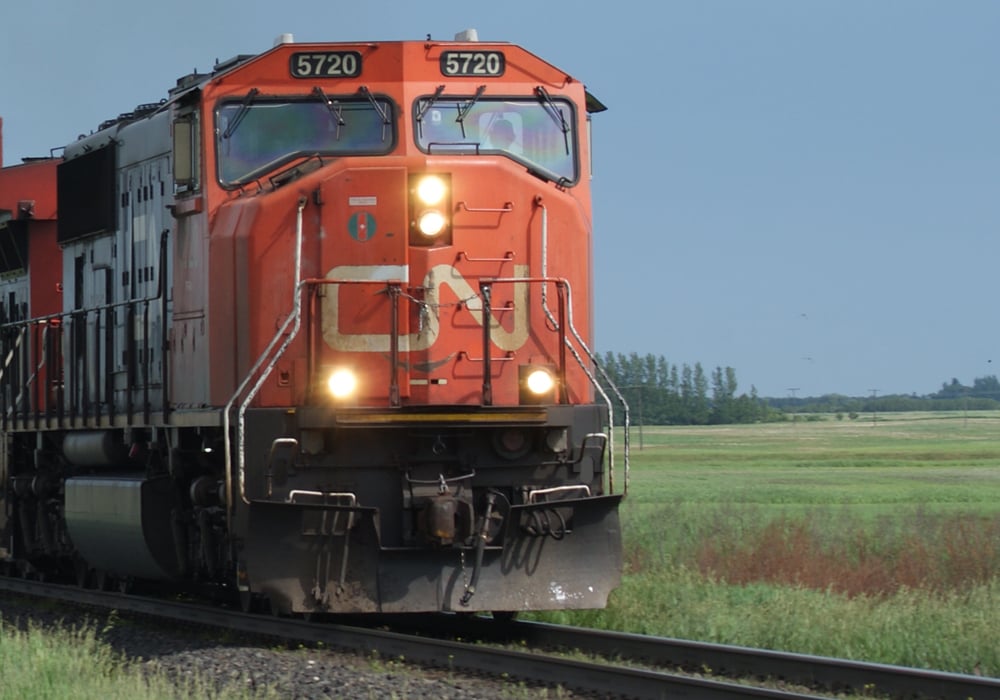Canada’s largest railway is setting up a farmer advisory council in Western Canada in an effort to forge closer ties with producers and improve overall supply chain performance.
Canadian National Railway announced earlier this month that it has established an agricultural advisory council consisting of primary producers and farmer representatives from Manitoba, Alberta, Saskatchewan and British Columbia.
The advisory council will help to strengthen the company’s stakeholder engagement efforts and “formalize ongoing consultations with diverse members of the agricultural industry,” the company said in an Aug. 1 news release.
Read Also

Container dispute embroils Port of Vancouver
GCT wants to expand its existing container terminal at the Port of Vancouver, but it is running into opposition from the port itself.
The council, which includes four members from Saskatchewan, three from Alberta, two from Manitoba and one from B.C., is the first of its kind for a Canadian railway company, CN added.
Another member from Ontario may be added in the future, said Sean Finn, the company’s executive vice-president of corporate services.
The council will be one of CN’s main consultative bodies, providing advice and feedback on the company’s annual grain plan as well as its winter grain plan, which outlines how the CN intends to move Western Canadian grain during the prairie winter.
It will also serve as a forum to discuss policy issues that affect the agricultural industry, including trends and disruptions in international trade, regulatory barriers, regional or seasonal service issues, port capacity and utilization and other emerging topics.
Finn said CN’s performance during the winter of 2017-18 led to a realization that the company needed to be more responsive to the needs of the grain industry.
The company determined that more consultation with different stakeholder groups would benefit the entire supply chain.
CN consulted with producer and shipper groups both before and after the publication of its 2018-19 annual grain plan, Finn added.
The formation of an ag advisory council is intended to formalize the consultation process and ensure that lines of communication are open between growers, producer organizations, commodity groups and railway company.
“Ad hoc consultations are OK … but we realized that we have to have a more formalized consultation process …,” Finn said in a recent interview with The Western Producer.
“We want them to give us their unfiltered advice and comments and we don’t want anyone thinking that they’re on the ag advisory committee because we want to influence the outcomes…. We want to get their advice on issues.”
The council is expected to meet about four times a year, twice in person and twice via teleconference.
Meetings will be chaired by Alanna Koch, a farmer from Edenwold, Sask., and former deputy minister of Saskatchewan Agriculture.
Other members of the group will include:
- Cherilyn Jolly-Nagel, a director with the Western Canadian Wheat Growers Association (WCWGA) from Mossbank, Sask.
- Todd Lewis, president of the Agricultural Producers Association of Saskatchewan (APAS) from Gray, Sask.
- Jim Wickett, chair of the WCWGA from Rosetown, Sask.
- Fred Greig, chair of the Manitoba Wheat and Barley Growers Association from Reston, Man.
- Paul Orsak, former director of the WCWGA from Russell, Man.
- Dave Bishop, chair of the Alberta Barley Commission and regional representative of the Alberta Wheat Commission from Barons, Alta.
- Jeff Nielsen, chair of Grain Growers of Canada and director with the Alberta Barley Commission from Olds, Alta.
- Bernie Schoorlemmer, former director at Alberta Pulse Growers from Rycroft, Alta.
- Barry Follensbee, director at B.C. Grain Producers Association and former director with the Canadian Canola Growers Association from Rolla, B.C.
The creation of the committee was announced last week, coinciding with the release of CN’s 2019-20 grain plan, a document that the company is required to submit annually before the beginning of each new crop year.
In its 2019-2020 grain plan, CN has increased its maximum sustainable capacity by 150 hopper car spots per week to 5,650 cars per week.
Maximum capacity will be reduced to 4,150 hopper car spots per week for a 17-week period in the winter months of December, January, February and March (grain weeks 17 through 34 inclusive).
In 2018-19, maximum car spot capacities were set at 5,500 per week in non-winter hauling periods and 4,000 per week in winter hauling periods.
Finn said the extra 150 car spots per week are the result of capital projects that have boosted overall capacity and increased CN network’s resiliency during winter operating conditions.
The CN plan, which can be viewed online here, also says unused intermodal capacity represents a lost opportunity for the western Canadian grain industry.
CN moved about one million tonnes of prairie grain in intermodal containers last year but there is potential to move a great deal more, CN said.
“Containers, which bring a variety of products primarily from Asia into Canadian ports, often return to ports empty,” the company’s grain plan states.
“As a result, a significant number of containers are available at CN intermodal terminals in the Prairie region for the use of grain customers. Not making full use of the available container capacity to move grain represents a lost opportunity, as these containers are returned to port using rail capacity, whether or not they are loaded.”
Finn said the company’s Saskatoon intermodal yard is currently the focal point of CN’s containerized grain program in Western Canada.
The opening of the InterMobil East Regina Intermodal Terminal during the 2019–20 crop year is also expected to increase the capacity available on the CN network to move grain by container directly from Western Canada to export destinations.
















